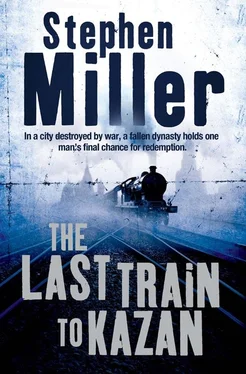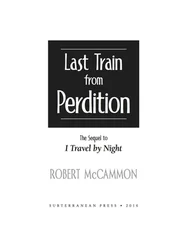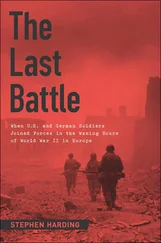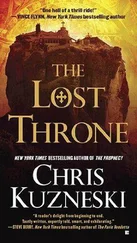Something had cracked, something under the pressures of civil war and counter-revolution had pushed events into an emergency. Events had obviously overrun whatever immunity he might have possessed as an employee of the French. It could be a change of plans on high; there was a faint possibility he could be some sort of bargaining chip, or maybe the French had given him up to the Cheka for some favour.
He would never know, and, whatever it was, the world had moved on. He was not a prize catch, there was nothing he could divulge that would make the slightest difference to either side. He thought it might possibly be that he was only being kept alive because of a clerical error.
In semi-sleep he heard the laughing guard coming along the corridor, his stick banging against the doors. Ryzhkov stood, his knees paining him, bladder full, every muscle gone stiff, reluctant. The stick approached, crossed his doorway and continued along the hall. He counted the doors. Three until the end, and then the guard turned back down the line, peering inside to check that everyone was alive this morning. The grill slid open. Ryzhkov looked into the watery blue eyes, the shock of blond hair.
‘Ah, good morning, Monsieur Ryzhkov,’ he called out. ‘You’re looking thinner, but why waste food on the likes of you when the people’s army needs nourishment, eh?’ Of course the guard didn’t know any of the details of his case, it was the only advantage Ryzhkov had over the boy.
‘I’m wondering if you have heard the latest news, that everyone on this corridor is to be executed. Did you know that? Only a matter of days, I’m afraid,’ and then the little laugh as the grill slid shut. The story continued to the next chamber. ‘…morning, Monsieur Swetovsky. Yes, you heard me correctly. We’re cleaning out all the dead wood…’
Ryzhkov walked the length of the cell, urinated into the bucket, and then returned to the door. The guard’s hearty greetings were still echoing down the hall. From somewhere there was the scuffling of boots on the tiles, a protesting voice, the sudden sound of metal against metal. It meant they were taking someone out. Now he could no longer hear the laughing guard; his cheeriness had evaporated. The men who came to take you were solemn when they did it. For them it was just a grim task, getting a physically reluctant creature from point A to B. More clatter along the corridor, the closing of the door, and then, finally, the laughter of the guard returned.
Ryzhkov walked the length of the cell a hundred times, folded over the mattress and sat on it and waited while the guard came at last to his door, slid the morning meal through the hinged gate. ‘There you are. A waste, if you ask me, since you’re going to die soon.’
‘Thank you very much,’ Ryzhkov said, rolling off the mat, dragging the plate across the floor and, hungry now, sipping the soup out of the tin before attacking the archipelago of cabbage marooned in the centre of the dish. There was a tiny sliver of something that looked like meat, or perhaps it was a stick of wood, a fragment of a cooking spoon or a ladle. It didn’t matter; he ate it.
The guard had developed an attachment to him. Perhaps because he was a mystery and Ryzhkov hadn’t offered the young man anything. A polite mystery, because that was the only way to deal with jailers. You couldn’t intimidate them, or abuse them. The only thing you could do was wait. There had been one revolution that had put him here, maybe another would free him.
The boy sat outside on a stool that he’d hauled down he corridor, taunted him with questions. Perhaps he saw it as a way of educating himself by studying the enemy, just as an apprentice angel might study a lesser demon. ‘I don’t understand you,’ he said to Ryzhkov. ‘You claim to be a revolutionary? That’s absurd. How can you say something like that?’
‘Absolutely.’ Ryzhkov was trying not to bolt the cabbage. It was all he would get until the evening, and as for activity, it was just about all he would do, unless using the bucket or strolling from wall to wall counted.
‘You claim that you are a clandestine operative. For the revolution also?’
‘I claim nothing. I already told them everything, and besides, it’s none of your business, is it, comrade?’
He laughs. ‘No, it’s not my business. But since you say you’re a revolutionary, then why are you here?’
‘There are many varieties of revolution, comrade. Why are you here?’
‘I’m here to detain and execute vermin like you. I’m killing capitalist rats, that’s what I’m doing.’
‘Ahh…Well, I’m not a capitalist, if that’s what’s worrying you. I have nothing, own nothing. Nothing at all. Never have. Not for a long, long time.’ Idly he wondered whatever had become of the apartment he had once owned in Petersburg. Probably a flophouse for deserving peasants.
‘I love to kill people like you. I am good at it,’ the boy said, unable to take the laugh out of his voice. ‘I have been recognized for my efforts. I’m to be given an award for diligence and valour.’
‘I thought there were to be no more medals in Russia?’
A pause while the guard thought it through. ‘That’s correct. Correct. No classes. Only levels of achievement, literacy, health for all, an end to drunkenness and debauchery. All the things that we have been lacking. Now they are within our grasp. Only a little more cleaning up to do. Only a few more vermin to kill…’ The laughter again. Forced. Ryzhkov slid the plate across the concrete floor and through the little hinged opening. ‘Now we are on the verge of attaining all the things we’ve been lacking, comrade Ryzhkov. I call you “comrade” because deep down I do believe you can be saved.’
‘With the grace of God.’
‘Don’t tell me you believe in that garbage.’ The laugh spluttered out in the corridor. The plate was abruptly swept away, the doorway flaps closed.
‘Perhaps I am simply hedging my bets.’
‘The church! Those are the ones responsible for all our undoing, moaning and groaning about an afterlife. People like Rasputin. If you’re one of them, you really do deserve to die.’ He spat and walked away.
Ryzhkov dozes. Although it is not dozing really, more like staring at the plastered wall until he falls into a trance, reliving the choices that led him first to the Okhrana, then to the fugitive life, then to the trenches, on and on, through all his life’s mistakes. While he is so occupied, there are new boots clacking down the corridor. A door is unlocked, thrown open. A man, screaming, jerked free of his own particular trance, is hauled out and away. A Bolshevik voice recites an ‘official’ proclamation of death. Another door is closed, and a few precious moments later…a splattering of gunfire.
And then they come again.
Ryzhkov is bolt upright now as the boots crash through the door, down the corridor. And he stands, stands as he has been taught at the precise centre of his cell, which now…he no longer wants to leave. Now it has become a place of safety. Home.
The door is wrenched open. Three toughs, and behind them is the laughing guard, the smile spreading across his wide blond face. ‘One less burzhui to deal with. One less parasite. I am going to be crying big tears of happiness! Oh, catch him!’ This last because Ryzhkov has fallen, either because he is weak from the rations or because he is terrified, or because after all of it – after all the times he has cheated death – this…this…
This is all happening too quickly. In front of him the tiled corridor, filthy since the guards of the Red Army are no longer compelled to perform menial jobs that soldiers normally perform. They bull along it. No one gets in their way; there are, after all, no officers to carry out inspections, to criticize the polishing of boots, the crease in one’s trousers…
Читать дальше












